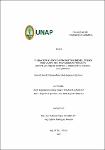| dc.contributor.advisor | Rojas Amasifén, Juan Manuel | |
| dc.contributor.advisor | Rodríguez Arévalo, Gabino | |
| dc.contributor.author | Tenazoa Vásquez, Geiner | |
| dc.contributor.author | Mallqui Canayo, José | |
| dc.date.accessioned | 2017-10-10T14:29:22Z | |
| dc.date.available | 2017-10-10T14:29:22Z | |
| dc.date.issued | 2017 | |
| dc.identifier.uri | http://repositorio.unapiquitos.edu.pe/handle/20.500.12737/5011 | |
| dc.description.abstract | Este estudio de investigación referente a la caracterización de productos derivados del tratamiento térmico de aceites lubricantes usados en la ciudad de Iquitos que abarca cuatro distritos: Iquitos, San Juan Bautista, Belén y Punchana región Loreto-Perú, se realizó entre el mes de julio de 2016 y abril del 2017. La caracterización preliminar de los aceites usados monogrado y multigrados recolectados mostraron que con el método cualitativo de chisporroteo existe un mínimo contenido de agua para ambos aceites; mientras que con la prueba Spot test se encontró mínima cantidad de aditivos lubricantes en los aceites lubricantes usados multigrados y nada en monogrado.
La caracterización fisicoquímica del aceite lubricante usado mostró un API entre 27.4-27.9; BSW% entre 0.05-0.05; %S entre 0.0498-0.041 y la Viscosidad a 40ºC en cSt entre 7.134-9.807; para monogrado y multigrado respectivamente. El tratamiento térmico aplicado a estos aceites mediante destilación a presión atmosférica, encontró un punto inicial de ebullición de 171ºC-155ºC y un temperatura a 90% de destilado colectado de 397ºC-372ºC, para monogrado y multigrado respectivamente. A la temperatura de referencia de 360ºC, el rendimiento de destilado de monogrado fue de 20% y de multigrado de 50%.
La caracterización del destilado (1) encontró el API entre 38.9-41.0; BSW% entre 0.00-0.00; %S entre 0.0378-0.029 y la Viscosidad a 40ºC en cSt entre 5.271-5.124; para monogrado y multigrado respectivamente. A la temperatura de referencia de 360ºC, el rendimiento del destilado (1) de monogrado fue de 90% y de multigrado de 95% a más. El diseño factorial 2^2, mostró el factor principal para la regeneración del aceite lubricante usado fue el tipo de aceite.
En las condiciones del tratamiento térmico no se encontró turbo, solamente un producto semejante a diésel #2. Finalmente, es posible regenerar el aceite lubricante usado en Iquitos tanto monogrado como multigrado para darle mayor valor agregado, prevenir y reducir la contaminación en la ciudad de Iquitos y en los ríos amazónicos. | es_PE |
| dc.description.abstract | This research study related to the characterization of products derived from the thermal treatment of lubricating oils used in the city of Iquitos that covers four districts: Iquitos, San Juan Bautista, Belén and Punchana region Loreto-Perú, was carried out between July 2016 and April 2017. The preliminary characterization of monograde and multigrade waste oils collected showed that with the qualitative sizzle method there is a minimum water content for both oils; while with the test Spot test was found minimum amount of lubricating additives in used lubricants multigrade and nothing in monograde. The physicochemical characterization of the used lubricating oil found the API between 27.4-27.9; BSW % between 0.05-0.05; % S between 0.0498-0.041 and Viscosity at 40
° C in cSt between 7,134-9,807; For monograde and multigrade respectively. The heat treatment applied to these oils by distillation at atmospheric pressure found an initial boiling point of 171 ° C-155 ° C and a temperature at 90% distillate collected from 397
° C-372 ° C, for monograde and multigrade respectively. At the reference temperature of 360 ° C, the monograde distillate yield was 20% and the multigrade 50%.
The characterization of the distillate (1) found the API between 38.9-41.0; BSW % between 0.00-0.00; % S between 0.0378-0.029 and Viscosity at 40 ° C in cSt between 5,271-5,124; For monograde and multigrade respectively. At the reference temperature of 360 ° C, the yield of monograde distillate (1) was 90% and of multigrade 95% to more.
The factorial design 2^2 showed the main factor for the regeneration of used lubricating oil was the type of oil.
Under the heat treatment conditions no turbo was found, only a product like diesel # 2. Finally, it is possible to regenerate the lubricating oil used in Iquitos, both monograde and multigrade, to give it benefit, to prevent and reduce pollution in the city of Iquitos and in the Amazonian rivers. | en_US |
| dc.description.uri | Tesis | es_PE |
| dc.format | application/pdf | es_PE |
| dc.language.iso | spa | es_PE |
| dc.publisher | Universidad de la Amazonía Peruana | es_PE |
| dc.rights | info:eu-repo/semantics/openAccess | es_PE |
| dc.rights | Attribution-NonCommercial-NoDerivs 3.0 United States | * |
| dc.rights.uri | http://creativecommons.org/licenses/by-nc-nd/3.0/us/ | * |
| dc.source | Universidad Nacional de la Amazonía Peruana | es_PE |
| dc.source | Repositorio institucional - UNAP | es_PE |
| dc.subject | Aceites lubricantes | es_PE |
| dc.subject | Tratamiento térmico | es_PE |
| dc.subject | Destilación | es_PE |
| dc.subject | Contaminación ambiental | es_PE |
| dc.title | Caracterización de productos (diésel, turbo) derivados del tratamiento térmico (destilación) de aceites lubricantes usados, en Iquitos | es_PE |
| dc.type | info:eu-repo/semantics/bachelorThesis | es_PE |
| thesis.degree.discipline | Ingeniería Química | es_PE |
| thesis.degree.grantor | Universidad Nacional de la Amazonía Peruana. Facultad de Ingeniería Química | es_PE |
| thesis.degree.level | Título Profesional | es_PE |
| thesis.degree.name | Ingeniero Químico | es_PE |
| thesis.degree.program | Regular | es_PE |
| dc.subject.ocde | http://purl.org/pe-repo/ocde/ford#1.04.02 | es_PE |


